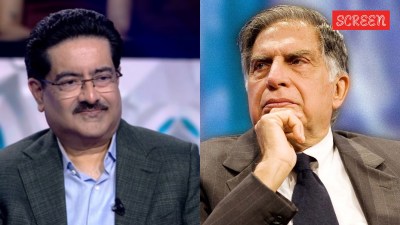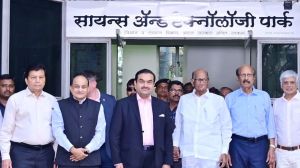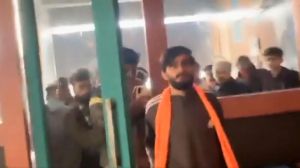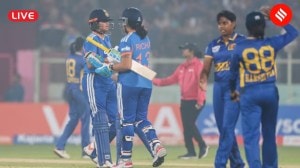Coalition or election?
I have a strange feeling that some nimble footed Congressmen are planning to dribble past all the others and score a solo goal. Recent hi...

I have a strange feeling that some nimble footed Congressmen are planning to dribble past all the others and score a solo goal. Recent history of the Congress informs us that whenever a player tries to score a solo goal, the game itself is changed. It ceases to be soccer or hockey. It becomes a distortion of Rugby and American football. The player running away with the ball is tackled by his own teammates and all of them get entangled in a huge scrum.
In simple language, some vague, tentative moves are afoot to alter the status quo at the Centre. These moves could manifest themselves in several ways. One such way is for Congressmen to change their style in Parliament. Well behaved, orderly, responsible opposition MPs sometimes begin to look like inanimate objects. So they must show more life and spunk; be aggressive.
But then what? Wait for the organisational elections in August? The assembly elections in Karnataka and Andhra Pradesh due in November? Supposing the Congress does as well in these electionsas it did in Rajasthan, Madhya Pradesh and Delhi, will it then be ready to make a bid for power at the Centre? But how will it go about doing this without giving up its declared policy that it does not wish to participate in coalitions which, on current showing, are in bad odour?
Between November 1999 and April 2000, Karnataka, Andhra Pradesh, Goa, Arunachal Pradesh, Orissa, Bihar, Maharashtra are all going in for state elections. Is it possible for the Election Commission, for sheer administrative tidiness, to bunch these elections together? And would it not be wonderful to go in for general elections simultaneously?
Brilliant. As P.V. Narasimha Rao would have advised in another context, sometimes taking no decision is the best decision of all. No epoch-making decisions were taken on the eve of the elections to the three states. No positive movement was required because the negative factor was operating against the BJP. Apply the same principle on a national scale: wait for the negatives to destroy theBJP.
But Congressmen argue that it were not just the negative factors that hit the BJP. It was sensible planning by the Congress during its bra-instorming sessions at Panchmarhi that did the trick. Remember how Mulayam Singh Yadav and Laloo Prasad Yadav were imploring the Congress to lead the alternative coalition in September last year, just when the Panchmarhi session was on.With great sense of purpose, the Congress refused to go in for coalitions. The Congress decided against coalitions on the eve of state elections for a simple reason: no coalitions were required in the three states in question. In all three it was a straight BJP-Congress fight.
From this experience, Congressmen drew the easy conclusion that the party does well when it is on its own. One set of Congress leaders, primarily from U.P., projected the quot;no-coalitionquot; formulation for their own specific reasons. The anti-Brahmin edge in Mulayam Singh Yadav8217;s politics affected them directly. Moreover, Mulayam had walked away with a large chunkof the traditional Congress support base, notably the minorities. In the short run, they preferred BJP rule to any alliance with Mulayam.
It made practical sense. After all, in the 1998 general elections the Congress had lost in all the 85 Parliamentary seats in U.P. It is even now faced with an enormous dilemma. Should it now support the forces fighting the BJP in other words support Mulayam and thereby liquidate itself altogether or should it tolerate a spell of BJP rule, fight Mulayam and hope that the BJP would squeeze him from above as well.
The Congress hope in U.P is that Sonia Gandhi8217;s charisma will somehow help it wean away the traditional support that has shifted to Mulayam. Surely, the Congress does not expect the Yadavs to abandon Mulayam. This leaves only the Muslims to be seduced.
True, the minorities are not hopelessly in love with Mulayam. They are with him because there is no other anti-BJP, winning party in sight. Yes, if the Bahujan Samaj Party and the Congress worked in tandem, thewinnability of the combination would be confirmed and the minorities would desert Mulayam.
But the BSP voted with the BJP in the Lok Sabha on Bihar and remains a formation whose alliance preferences are impossible to anticipate.
However, the apparently static political scene in U.P. could acquire a dynamics of its own from a quarter many people are not looking at. Unlike in Bihar, where the party was traditionally dominated by Bhumihars and Rajputs like Sri Krishna Sinha and Anugrah Narain Singh, the Congress in U.P. was always dominated and supported by Brahmins.
In the wake of Mandalisation, the party8217;s Brahmin support base defected to the BJP. Ironically, the BJP too had become sensitive to the OBC support. This is what explains Kalyan Singh, a Lodh, being retained as a Chief Minister in preference to, say, Kalraj Mishra. This Brahmin support would return to the Congress if the party projected in U.P. a fresh, Brahmin face.
But no volume of alteration in the political combinations can weld theCong-ress into a winning force in the foreseeable future. We are then back to square one: should the Congress work towards an understanding with someone like Mulayam or give more rope to the BJP?
The basic dilemma the Congress faces is this: Sonia Gandhi cannot manage the messy coalition the 12th Lok Sabha has to offer. Without organising a coalition a situation cannot be created for fresh elections. Should someone else be installed in the gaddi at New Delhi as an interim arrangement, there is no guarantee that this faceless someone will vacate the gaddi when required. Moreover, even if elections are held at the time of Congress8217; choosing, by no stretch of the imagination can the Congress get anywhere beyond 200 seats. Which means a coalition again. So far Sonia Gandhi has not granted a single press interview. How are we to know that, given the compulsions even after the next elections, she will be able to manage a coalition.
- 01
- 02
- 03
- 04
- 05































